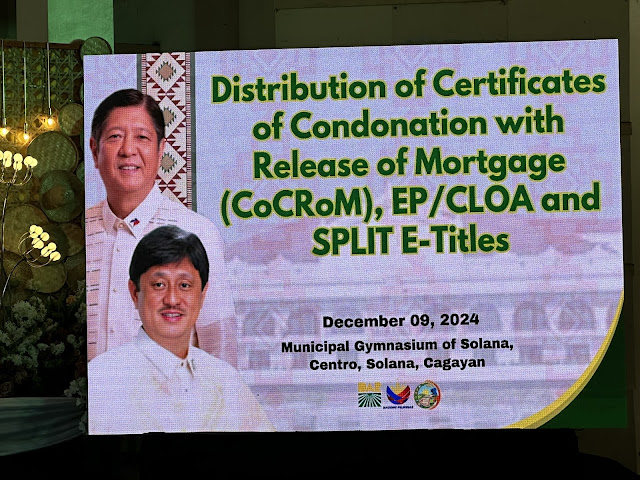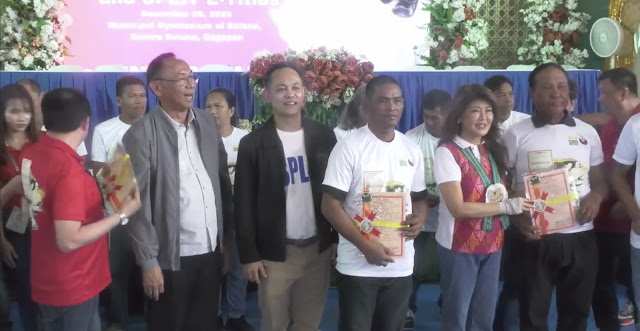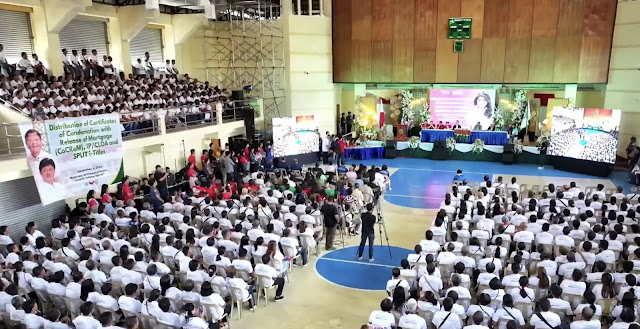The Department of Agrarian Reform-World Bank Project SPLIT
(Support to Parcelization of Lands for Individual Titling Project) is a
landmark initiative in the Philippines' agrarian reform landscape. It
represents a concerted effort by the Department of Agrarian Reform (DAR), with crucial
financial and technical assistance from the World Bank, to address a
long-standing challenge associated with the Comprehensive Agrarian Reform
Program (CARP): the prevalence of Collective Certificates of Land Ownership
Award (CCLOAs).
To fully understand Project SPLIT, it's essential to delve into the context of CCLOAs, the problems they
pose, and how this project aims to provide a more empowering solution through
individual land titles.
Understanding Collective CLOAs: Under CARP, land ownership
was often granted to a group of agrarian reform beneficiaries (ARBs)
collectively, rather than issuing individual titles for specific parcels. While
this approach facilitated the initial distribution of land, it inadvertently created
several complexities and limitations for the ARBs in the long run.
The Challenges Posed by Collective CLOAs: Internal Disputes
and Boundary Issues: Without clearly defined individual boundaries within the
collective title, disagreements and conflicts among co-owners regarding land
use, inheritance, and responsibilities often arose.
Limited Access to Credit and
Financial Services: Financial institutions are generally hesitant to accept
collectively owned land as collateral for loans. This significantly hampered
the ability of ARBs to access crucial capital for farm improvements, purchase
equipment, or weather financial hardships.
Difficulties in Availing
Government Programs: Many government agricultural support programs and
subsidies require individual land titles as a prerequisite for eligibility,
effectively excluding ARBs with collective titles.
Constraints on Land Transfer and Inheritance: Transferring
or inheriting shares in a collectively owned land title can be a complex and
often contentious process, hindering the smooth transition of land to the next
generation.
Reduced Incentive for Individual
Investment: When ownership and benefits are shared, individual ARBs may be less
motivated to invest in long-term improvements or adopt innovative farming
techniques on their specific portion of the land.
Exclusion of Rightful Heirs: Over
time, the original set of beneficiaries might pass away, and including their
rightful heirs in the collective ownership structure often becomes
administratively burdensome, sometimes leading to the exclusion of legitimate
claimants.
Project SPLIT: The Solution Through Individual Titling
Recognizing these significant
drawbacks, the Philippine government, through the DAR, sought a comprehensive
solution. This led to the conceptualization and implementation of Project
SPLIT, with the invaluable support of the World Bank. The core objective of
Project SPLIT is to parcelize or subdivide these existing collective CLOAs into
individual land titles, thereby empowering the ARBs with clear and distinct
ownership of specific portions of land.
Key Components and Processes of Project SPLIT:
Project SPLIT is a complex undertaking that involves several
critical stages:
1. Identification and Validation of CCLOAs: The
initial phase involves identifying all existing CCLOAs nationwide and verifying
their status and the list of original beneficiaries.
2. Ground Survey and Parcelization: This is a
crucial technical stage where geodetic engineers conduct detailed surveys of
the land covered by each CCLOA, if the land has not yet been subdivided. Based
on factors like the original allocation, existing land use, and agreements
among the beneficiaries, the land is subdivided into individual parcels with
clearly defined boundaries.
3. Documentation and Titling: Once the parcels
are surveyed, the necessary legal documentation is prepared for the issuance of
individual Certificates of Land Ownership Award (CLOAs) or electronic titles
(e-Titles). This involves rigorous verification processes to ensure accuracy
and prevent fraudulent claims.
4. Generation and Distribution of Individual
Titles: The newly generated individual titles, often in the form of secure and
easily transferable e-Titles, are then distributed to the rightful ARBs. This
process is often conducted in coordination with local government units and
community organizations.
5. Information and Education Campaigns:
Alongside the titling process, DAR conducts information and education campaigns
to ensure that ARBs understand their rights and responsibilities as individual
landowners. This includes guidance on land management, membership to agrarian
reform beneficiaries’ organizations (ARBOs), accessing support services, and
avoiding potential pitfalls.
6. Strengthening Institutional Capacity: Project
SPLIT also aims to enhance the capacity of the DAR in land administration,
surveying, and titling processes to ensure the sustainability of individual
titling efforts beyond the project’s lifespan.
The Expected Impact and Benefits of Project SPLIT
The successful implementation of
Project SPLIT is expected to yield significant positive impacts for the
agrarian reform beneficiaries and the broader agricultural sector, such as:
Enhanced Tenure Security: Individual titles provide ARBs
with undisputed ownership, fostering a greater sense of security and control
over their land.
Improved Access to Credit and
Financial Services: With individual titles, farmers can readily use their land
as collateral to access loans from formal financial institutions, enabling them
to invest in farm improvements and other income-generating activities.
Increased Participation in
Government Programs: Individual landowners become eligible for a wider range of
government agricultural support programs, such as subsidies, training, and
infrastructure development.
Facilitated Land Transfer and
Inheritance: Individual titles simplify the process of transferring land to
heirs, ensuring the continuity of land ownership within families.
Greater Incentive for Investment
and Productivity: Secure and individual ownership encourages farmers to invest
in sustainable farming practices, adopt modern technologies, and cultivate high-value
crops, leading to increased productivity and income.
Reduced Land Disputes and
Improved Community Relations: Clearly defined boundaries and individual
ownership minimize the potential for conflicts and promote more harmonious
relationships within agrarian communities.
Empowerment and Dignity: Owning a
piece of land individually provides farmers with a greater sense of
empowerment, dignity, and control over their own destinies.
Current Status and Challenges
Project SPLIT is a multi-year undertaking that commenced in
2021 and is currently in its implementation phase. While significant progress
has been made in various provinces across the Philippines, including the
ongoing efforts in regions like Cagayan Valley, the project faces inherent
challenges due to the sheer scale of the task, including:
Complex Surveying and Validation:
Accurately surveying and validating the boundaries and rightful beneficiaries
for numerous CCLOAs requires significant time and resources.
Logistical and Administrative
Hurdles: Managing the vast amount of documentation and coordinating with
various stakeholders at the national and local levels presents logistical and
administrative complexities.
Potential for Conflicts and
Disputes: While the project aims to resolve disputes, the parcelization process
itself can sometimes trigger new disagreements among beneficiaries regarding
the subdivision of land.
Ensuring Sustainability: Building
the long-term capacity of DAR to continue individual titling efforts beyond the
project's timeline is crucial for lasting impact
The DAR-World Bank Project SPLIT
represents a crucial step forward in strengthening agrarian reform in the
Philippines. By addressing the limitations of collective land ownership through
the provision of individual titles, the project aims to unlock the full
potential of agrarian reform beneficiaries, fostering greater economic
empowerment, social stability, and agricultural productivity in rural
communities across the nation, including areas like Solana for instance, and the
wider Cagayan Valley region. While challenges remain, the commitment of the DAR
and the support of the World Bank offer a promising pathway towards a more
equitable and prosperous future for Filipino farmers.
Ensuring Accuracy and Transparency: The Field Validation
Process of CLOAs and ARBs in Cagayan and Batanes.
The Department of Agrarian Reform (DAR), in partnership with
the World Bank, is implementing the Support to Parcelization of Lands for
Individual Titling (SPLIT) Project, a groundbreaking initiative designed to
issue individual titles for agrarian reform beneficiaries (ARBs). But before
these land titles can be awarded, a critical step takes place—Field Validation.
In Cagayan and Batanes, Field
Validation Teams (FVTs) are at the forefront of ensuring that the records of
land distribution and the identities of ARBs are correct. This detailed process
ensures that the land being titled corresponds accurately to the rightful
beneficiaries, fostering transparency, equity, and trust within communities.
The work of the FVTs plays a pivotal role in the success of the SPLIT Project,
which is already making strides in uplifting the livelihoods of agrarian reform
beneficiaries across the region.
The Purpose of Field Validation
Field validation is the key
process of confirming the accuracy and completeness of the Certificates of Land
Ownership Award (CLOAs) issued to land reform beneficiaries. In simple terms,
the process ensures that:
1. The Correct Beneficiary is
Identified: The validation confirms that the CLOA holders are the rightful
owners of the land.
2. Land Boundaries Are Clear: The
land in question is mapped and correctly allocated to the designated
beneficiary.
3. No Overlaps or Disputes: The
team checks for potential conflicts over land ownership and ensures that land
areas are not claimed by multiple people.
4. All Documents Are In Order:
Field teams verify that all supporting documents, such as previous land surveys
and reports, are accurate and up-to-date.
For the DAR, this is an essential
step before the actual titling process can begin. It serves as a safeguard,
preventing future land disputes that could undermine the spirit of agrarian
reform.
The Field Validation Teams at Work
The Field Validation Teams (FVTs)
are composed of Contract-Of-Service (COS) personnel, technical experts such as legal
officers, geodetic engineers, etc., all equipped with a deep understanding of pertinent
laws, policies, and mapping tools. Their job is to physically visit the land in
question, conduct surveys, and interview the ARBs and local residents to gather
firsthand information for the parcelization, the environmental and social
safeguards, etc.
These teams are often dealing
with diverse terrain, from the coastal areas of Cagayan and Batanes to the
fertile plains of the same. This complexity requires precise navigation, a keen
eye for detail, and patience, especially since many areas are remote and
difficult to access.
Key Steps in the Field Validation Process:
1. Initial Surveying and Mapping:
Surveyors first gather existing maps and records from the land titling process.
This involves reviewing the boundaries of the collective CLOAs and identifying
the areas that need further validation.
2. Site Visits: The FVT travels
to the barangays, meeting with ARBs and local stakeholders. During these
visits, the teams cross-check land boundaries, confirm the identities of the
ARBs, and identify any disputes or concerns about land ownership. They also
take note of the condition of the land and any changes in its use or ownership
over time.
3. Interviews and Community
Consultation: One of the most important parts of the field validation is the
community consultation. The team interviews local farmers, barangay officials,
and other key figures to gather testimonies and historical accounts that will
help clarify any uncertainties.
4. Dispute Resolution: In some
cases, the FVT encounters conflicting claims on land ownership. These
situations require careful negotiation and documentation. If necessary, the
team works with the legal offices of DAR to mediate and resolve conflicts. This
ensures that the final titling process is fair and transparent.
5. Verification of Documents: The
FVT also examines official records, including the original CLOAs, cadastral
surveys, and other pertinent documents, to ensure they align with the physical
conditions on the ground.
6. Data Recording and Reporting: After completing the
on-the-ground validation, the FVT compiles a detailed report. This report
includes all findings, land measurements, beneficiary confirmations, and any
issues requiring resolution. The report is submitted to the DAR provincial office,
which will then proceed with the next steps of the titling process.
The Impact on Cagayan and Batanes agrarian reform
beneficiaries (ARBs)
The field validation process has
profound effects on the farmers and communities in Cagayan and Batanes. For
many ARBs, receiving an individual land title is more than just a legal
formality—it is a pathway to increased security and opportunity.
Moreover, by ensuring that land
titles are issued correctly, the SPLIT project minimizes the risk of future
conflicts and promotes land tenure security. Farmers are more likely to access
credit, government programs, and agricultural resources when they have legal
proof of ownership, leading to better agricultural practices and more
sustainable farming methods.
A Transparent and Participatory Process
The success of the SPLIT project
lies not only in its technical execution but also in its inclusive and
transparent nature. By engaging local communities, the FVTs foster a sense of
ownership and trust. Farmers, local officials, and community leaders are not
passive recipients of change—they are active participants in ensuring the
success of the titling process.
Through this collaborative
approach, the SPLIT project is strengthening the very foundations of agrarian
reform. By securing land rights, the project is not only improving the
livelihoods of farmers but also enhancing the social fabric of rural communities.
As the field validation process
continues across Cagayan and Batanes, the SPLIT project remains committed to
ensuring that the land rights of every ARB are respected and upheld. Through
careful validation, consultation, and conflict resolution, the project is
making significant strides in promoting equitable and transparent land
ownership in the region.
For the farmers of Cagayan and
Batanes, the road to individual land titles may be long and challenging, but
with each successful validation, they are one step closer to a more secure and
prosperous future.
A New Chapter
Unfolds: Cagayan Farmers Receive Digital Keys to Their Land Under Project SPLIT
Solana, Cagayan, December 9, 2024 – A palpable
sense of hope and anticipation filled the air in this town as 581 agrarian
reform beneficiaries (ARBs) from across Cagayan province gathered to receive
their long-awaited 981 electronic Certificates of Land Ownership Award
(e-Titles), covering around 728 hectares of rice and corn lands under the
Department of Agrarian Reform (DAR)-World Bank supported Project SPLIT (Support
to Parcelization of Lands for Individual Titling). This momentous occasion
marks a significant stride towards providing individual and secure land
ownership, promising a future filled with greater opportunities and empowerment
for these hardworking farmers.
For generations, many ARBs in
Cagayan have held collective CLOAs, a system that, while initially intended to
distribute land, often led to complexities in land management, access to
credit, and inter-generational transfer. Project SPLIT, a collaborative endeavor
between the DAR and the World Bank, aims to rectify this by subdividing these
collective titles into individual ones, granting farmers clear and distinct
ownership of their respective parcels.
The event saw beaming farmers
proudly holding their e-Titles, tangible proof of their individual ownership.
Unlike traditional paper titles, these digital documents offer enhanced
security, ease of transfer (in the future, following legal processes), and streamlined
record-keeping. The transition to e-Titles is a testament to the government’s
commitment to modernizing land administration and ensuring the integrity of
land ownership records.
“This e-Title is more than just a
piece of paper, or in this case, a digital file,” exclaimed Aling Maria, a rice
farmer from Solana, her voice thick with emotion as she clutched the printed
confirmation of her e-Title. “For years, we shared the land with many families.
It was often difficult to agree on things, and getting a loan was almost
impossible. Now, this is ours. We can finally plan for our future, invest in
our farm, and leave a clear inheritance for our children.”
The distribution event was graced
by Senator Imee R. Marcos along with key officials from the DAR headed by Secretary
Conrado Estrella III, who was represented by ASEC Eugene P. Follante, also present were representatives from national government agencies and local
government units (LGUs) who reiterated their commitment to the success of
Project SPLIT. Senator Imee Marcos her message emphasized the transformative
potential of individual titling. “Project SPLIT is not just about dividing
land; it’s about empowering individuals,” she stated. “By providing secure and
individual ownership, we are unlocking the potential of our farmers to become
more productive, access vital resources, and contribute significantly to the
agricultural development of Cagayan Valley.”
The process of generating these
e-Titles under Project SPLIT involves meticulous surveying, validation, and the
use of advanced technology to ensure accuracy and efficiency. Geodetic
engineers and DAR personnel have been working tirelessly on the ground,
delineating boundaries and ensuring that the individual titles accurately
reflect the landholdings of the beneficiaries.
Beyond the distribution of
e-Titles, the DAR is also actively providing crucial support services to the
ARBs. These include training on modern farming techniques, access to credit
facilities, and linkages to markets, ensuring that the newly empowered landowners
have the resources they need to thrive.
The awarding ceremony in Solana,
Cagayan, is just one of many such events planned across the Philippines under
Project SPLIT. The initiative aims to cover a vast expanse of land under
collective CLOAs, impacting the lives of hundreds of thousands of ARBs
nationwide.
For the farmers of Cagayan, the
day marked not just the receipt of a digital document, but the dawn of a new
era. With individual ownership secured through Project SPLIT e-Titles, they can
now look forward to a future with greater security, enhanced opportunities, and
the well-deserved fruits of their labor belonging solely to them and their
families. The digital keys they received today have unlocked a world of
possibilities, paving the way for a more prosperous and sustainable
agricultural landscape in the fertile plains of Cagayan Valley.
 |
| Video link of Distribution of Certificates of Condonation with Release of Mortgage (CoCRoM), EP/C… |
 |
| Click to open Link to PIA webpage... |






















